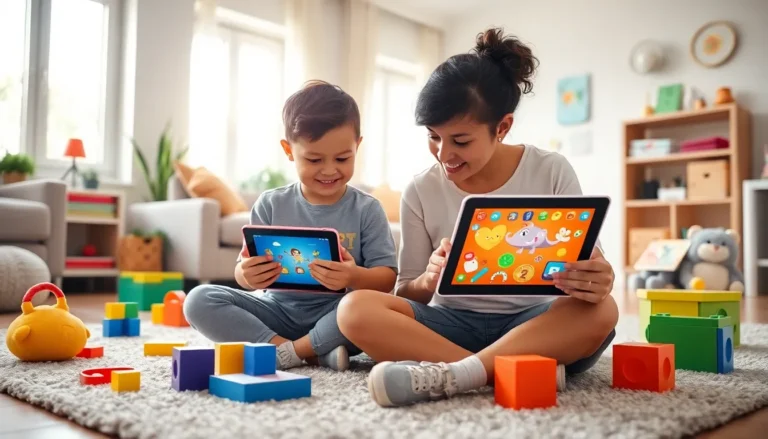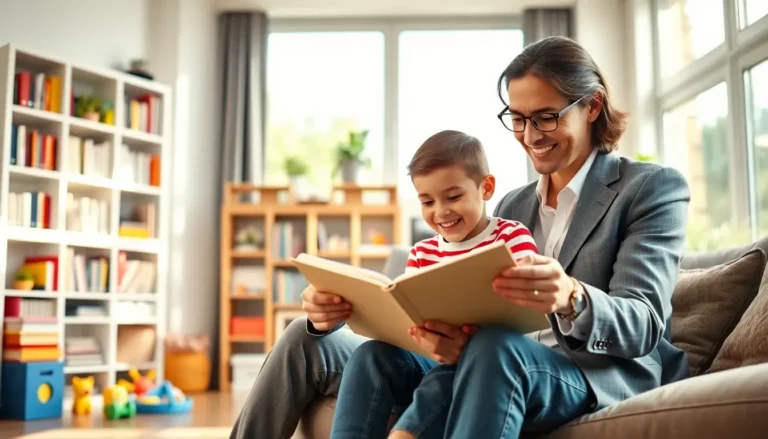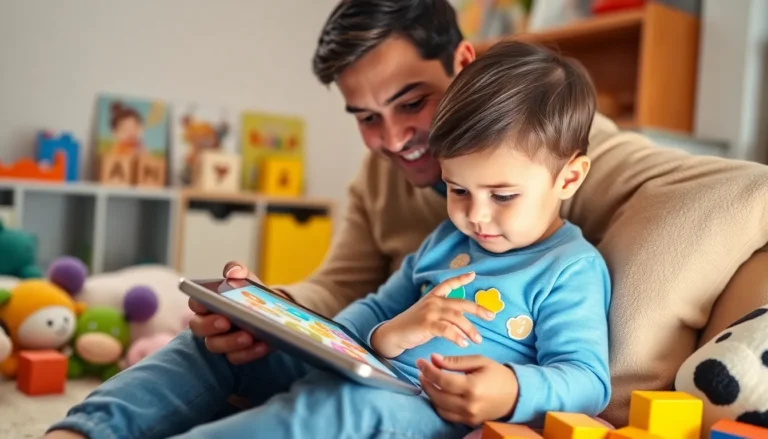Parenting can feel like a circus act where the tightrope is made of Legos and the audience is a toddler with a juice box. But not all parents juggle the same way. While solo and single parenting might sound like two sides of the same coin, they’re more like apples and oranges—both fruit, but distinctly different.
Table of Contents
ToggleUnderstanding Parenting Styles
Parenting styles significantly impact a child’s development and can differ vastly between solo and single parents. Solo parenting involves one individual taking responsibility for all aspects of child-rearing without shared parenting duties. Conversely, single parenting often refers to a situation where one parent, due to separation or divorce, primarily raises the child while the other parent may still play a role.
Solo parents usually manage every decision independently, which can foster confidence in their parenting skills. Challenges often arise, ranging from emotional exhaustion to financial strain, as they juggle work and home life in isolation. High levels of stress can occur due to the lack of emotional support and shared responsibilities.
Single parents typically navigate co-parenting arrangements with the other parent, which can lead to varying levels of cooperation. This dynamic sometimes provides emotional and practical support, yet it can also involve conflict and differing parenting philosophies. Conflicts may arise when schedules don’t align or when decisions about the child’s upbringing are debated.
Both styles demand adaptability and resourcefulness. Solo parents might find creative solutions alone, while single parents often need to compromise with another adult. Communication, whether with a co-parent or within the family unit, remains crucial to success in both scenarios.
Coping strategies play a vital role in each style. Participating in support groups can benefit solo parents seeking community. Engaging in open dialogues can aid single parents collaborating with their co-parent. Understanding these differences in parenting styles highlights the unique challenges each group faces while raising children.
Definition of Solo Parenting
Solo parenting entails one individual tackling all responsibilities of raising a child without shared support. This situation typically arises from factors such as choice, circumstance, or the absence of another parent.
Characteristics of Solo Parenting
Solo parenting often includes full control over decision-making, financial management, and daily routines. A solo parent navigates every aspect of their child’s life alone. Emotional resilience becomes crucial, as solo parents cultivate solutions independently. They prioritize responsibilities, balancing work and home life without the backing of a partner. Moreover, solo parents may rely heavily on external resources such as community support or childcare services.
Challenges Faced by Solo Parents
Solo parents encounter significant emotional and financial stress. They face exhaustion from juggling multiple roles, often resulting in burnout. Lack of shared responsibilities compounds these challenges, creating a sense of isolation. Budget constraints frequently arise due to single-income households. Additionally, time management becomes critical, with solo parents needing to delegate household tasks effectively. Solutions like support groups or local parenting organizations can provide essential relief and encouragement through shared experiences.
Definition of Single Parenting
Single parenting involves one parent primarily raising a child with varying degrees of involvement from the other parent. This dynamic often stems from circumstances like divorce, separation, or the choice to raise children independently.
Characteristics of Single Parenting
Single parenting is characterized by shared responsibilities and co-parenting dynamics. The primary caregiver often makes crucial decisions regarding the child’s upbringing, education, and welfare. Communication with the other parent plays a vital role, aiding in maintaining consistency for the child. Flexibility in parenting styles is common to adapt to changing situations. Support systems, such as family or friends, frequently assist single parents in managing daily challenges. Emotional resilience is essential as single parents navigate both joy and stress in their parenting journey.
Challenges Faced by Single Parents
Single parents often encounter a range of challenges that can impact their well-being. Time constraints become apparent as they juggle work, household responsibilities, and childcare. Financial strain frequently affects single-parent households, demanding careful budgeting and resource management. Emotional challenges, including feelings of loneliness or stress, may arise due to the pressure of handling parenting alone. Creating a balanced routine can also prove difficult, with many single parents feeling stretched thin between various demands. Utilizing support networks, such as parenting groups or professional counseling, often helps in addressing these challenges effectively.
Key Differences Between Solo and Single Parenting
Solo and single parenting present unique challenges and experiences that differ significantly. Understanding these key differences clarifies the dynamics involved in each parenting style.
Support Systems
Support systems differ greatly in solo and single parenting. Solo parents often lack a consistent support network, relying primarily on themselves for emotional, financial, and logistical help. Resources available to them may include community support, parenting groups, or childcare services. Conversely, single parents commonly engage in co-parenting arrangements, allowing them to share responsibilities and seek emotional support from the other parent or extended family. This collaborative approach provides a safety net, which can alleviate stress and pressure. Examples of effective support systems for single parents include formal agreements for shared childcare responsibilities and regular communication with the other parent.
Legal Considerations
Legal considerations play a significant role in the differences between solo and single parenting. Solo parenting usually involves no legal obligation from an absent parent, as decisions reside solely with that parent. This situation might foster challenges, such as the need for legal documentation for schooling or medical care. On the other hand, single parenting often involves legal arrangements that define custody, visitation rights, and financial obligations. Courts typically mediate these cases, establishing clear guidelines for both parents. Therefore, single parents often need to remain informed about legal matters to ensure their children’s best interests are met.
Emotional Impact on Parents and Children
Emotional experiences differ significantly between solo and single parents. Solo parents often feel overwhelming stress due to managing every aspect of parenting alone. This lack of support can lead to isolation and emotional exhaustion. In contrast, single parents dealing with co-parenting arrangements might feel the pressure from ongoing negotiations and potential conflicts.
Children in solo parenting situations may perceive their parent as a primary source of strength but also a figure facing constant challenges. Emotional struggles can manifest in children as anxiety or feelings of being a burden. Additionally, solo parents might find that their emotional state directly impacts their child’s emotional development.
Conversely, children of single parents often benefit from having access to both parents, even if interactions are limited. Communication between co-parents can foster a more stable environment, enhancing the child’s sense of security. Flexibility in parenting styles may expose children to diverse perspectives, aiding in their emotional growth.
Feelings of frustration may arise for both parents and children in either situation. Solo parents might express feelings of inadequacy as they wrestle with the demands of raising a child alone. Meanwhile, single parents could experience resentment when balancing their needs with co-parenting duties.
Support networks play a crucial role in mitigating these emotional impacts. Solo parents often gain strength from community support, which can reduce feelings of isolation. Single parents typically lean on co-parenting alliances and extended family for emotional relief, helping to create a more nurturing environment for their children.
Understanding the differences between solo and single parenting is essential for anyone navigating these unique paths. Each style presents its own set of challenges and rewards that significantly impact both parents and children. Solo parents often rely solely on themselves, facing emotional and financial hurdles without shared support. In contrast, single parents typically engage in co-parenting, balancing responsibilities with another parent while managing their own emotional landscape.
Recognizing these distinctions can foster empathy and support for those in either situation. By leveraging available resources and building strong support networks, both solo and single parents can thrive, ensuring a nurturing environment for their children.








